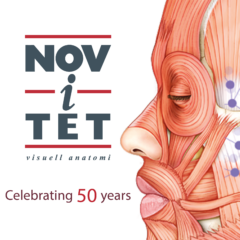New Novartis Kisqali NATALEE data in early breast cancer
Longer-term Novartis Kisqali® NATALEE data show durable reduction in distant recurrence in broad population of patients with early breast cancer
- Reduction in distant recurrence consistently deepened beyond 3-year Kisqali treatment duration in patients with node-positive (N+) and high-risk node-negative (N0) disease, as well as between anatomical stages1
- Real-world 5-year distant recurrence data in high-risk patients with HR+/HER2- early breast cancer (EBC), regardless of nodal status, highlights importance of adding a CDK4/6 inhibitor to endocrine therapy for all eligible patients2
- Late-breaking Kisqali data presentations at SABCS follow recent FDA and EMA approvals and recognition by NCCN Clinical Practice Guidelines in Oncology (NCCN Guidelines®*) as only Category 1 preferred adjuvant treatment for both N+ and high-risk N0 disease in combination with AI3
Basel, December 10, 2024 – Novartis today announced results from an updated analysis of the pivotal Phase III NATALEE trial of Kisqali® (ribociclib) that underscore the extended efficacy beyond the duration of treatment in combination with endocrine therapy (ET). Results showed a sustained reduction in distant recurrence of 28.5% (HR=0.715; 95% CI 0.604-0.847; nominal P<0.0001), compared to ET alone, in patients with stage II and III hormone receptor-positive/human epidermal growth factor receptor 2-negative (HR+/HER2-) early breast cancer (EBC)1.
Reduction in distant recurrence, known as distant disease-free survival (DDFS), is a decrease in the rate of cancer returning and spreading to other organs. The DDFS with Kisqali was consistent across all pre-specified patient subgroups, including those with node-negative (N0) disease1. These late-breaking data are being presented at the 2024 San Antonio Breast Cancer Symposium (SABCS).
”In day-to-day practice, we see a real and persistent risk of breast cancer coming back after early diagnosis, often as metastatic disease,” said Paolo Tarantino, M.D., Advanced Fellow at Dana-Farber Cancer Institute and Harvard Medical School. “The latest NATALEE and real-world data presented at SABCS reaffirm we can better address risk of recurrence for all patients at high-risk, including selected patients with node-negative disease, by offering them adjuvant CDK4/6 inhibitor treatment in addition to endocrine therapy.”
DDFS results across pre-specified subgroups1,4**:
|
Subgroup |
Hazard Ratio |
95% CI |
|
Intention-To-Treat Population |
0.715 |
0.604-0.847 |
|
AJCC Tumor Stage IIA |
0.396 |
0.218-0.720 |
|
AJCC Tumor Stage IIB |
0.806 |
0.524-1.238 |
|
AJCC Tumor Stage IIIA |
0.697 |
0.524-0.926 |
|
AJCC Tumor Stage IIIB |
0.569 |
0.326-0.994 |
|
AJCC Tumor Stage IIIC |
0.878 |
0.649-1.188 |
|
Node-negative disease |
0.696 |
0.403-1.204 |
|
Node-positive disease |
0.726 |
0.608-0.867 |
Safety remains consistent with previous reports, and no new safety signals were identified5. Adverse events (AEs) of special interest (grade 3 or higher) were neutropenia (44.4%), liver-related AEs (e.g., elevated transaminases) (8.6%), and QT interval prolongation (1.0%)5.
Real-World Risk of Distant Recurrence
Further, real-world evidence presented at the meeting highlights the relatively high incidence of distant recurrences within 5 years despite ET monotherapy for patients at high-risk, regardless of nodal involvement2.
”On the heels of its U.S. FDA and EMA approvals in early breast cancer, it is encouraging to see the continued benefit of adding Kisqali to standard endocrine therapy to help reduce the risk of recurrence,” said Jeff Legos, Executive Vice President, Global Head of Oncology Development, Novartis. “These data, together with the recent NCCN Guidelines® Category 1 preferred treatment recommendation for all eligible patients with early breast cancer, reinforce the opportunity to evolve adjuvant treatment to help a broader group of people.”
Additional research presented at the meeting further demonstrates the ongoing focus of Novartis to advance the care of people with breast cancer, including studies investigating the potential of radioligand therapies in the treatment of metastatic breast cancer (MBC)6.
*NCCN makes no warranties of any kind whatsoever regarding their content, use or application and disclaims any responsibility for their application or use in any way.
**The 4-year DDFS analysis was not prespecified and the trial was not powered to demonstrate statistical significance of these results.
About NATALEE
NATALEE is a global Phase III multi-center, randomized, open-label trial to evaluate the efficacy and safety of Kisqali with ET as an investigational adjuvant treatment versus ET alone in patients with stage II and III HR+/HER2- EBC, being conducted in collaboration with TRIO7,8. The adjuvant ET in both treatment arms was a non-steroidal aromatase inhibitor (NSAI; anastrozole or letrozole) and goserelin if applicable7,8. The primary endpoint of NATALEE is invasive disease-free survival (iDFS) as defined by the Standardized Definitions for Efficacy End Points (STEEP) criteria7,8. A total of 5,101 adult patients with HR+/HER2- EBC across 20 countries were randomized in the trial7,8.
Kisqali was developed by Novartis under a research collaboration with Astex Pharmaceuticals.





